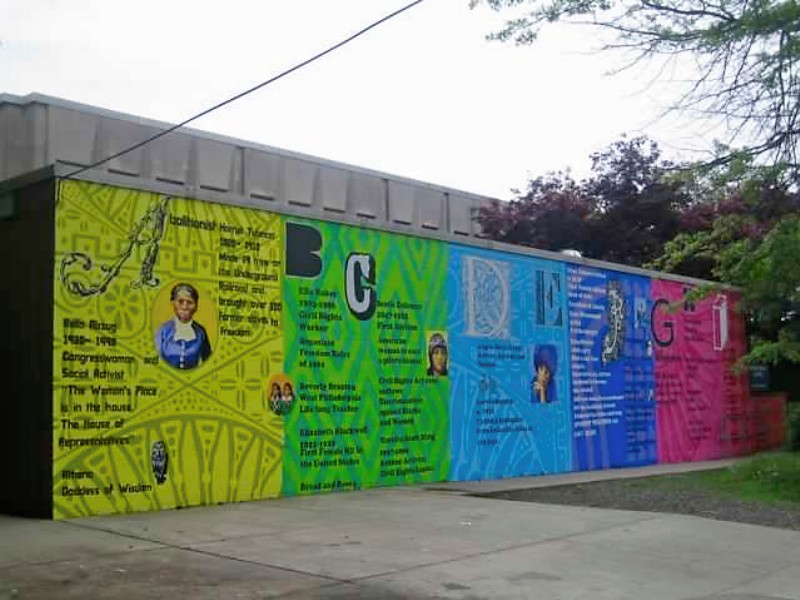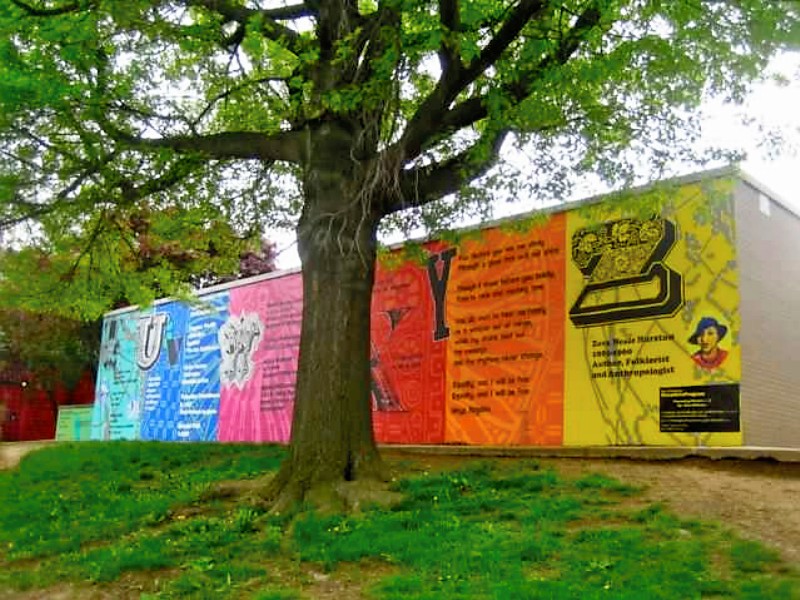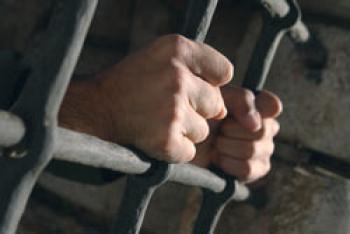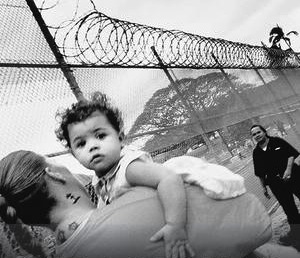Serendip is an independent site partnering with faculty at multiple colleges and universities around the world. Happy exploring!
Walled Women



POST YOUR THOUGHTS HERE
Welcome to the on-line conversation for Women in Walled Communities, a cluster of three courses in a new 360° @ Bryn Mawr College that focuses on the constraints and agency of individual actors in the institutional settings of women's colleges and prisons.
This is an interestingly different kind of place for writing, and may take some getting used to. The first thing to keep in mind is that it's not a site for "formal writing" or "finished thoughts." It's a place for thoughts-in-progress, for what you're thinking (whether you know it or not) on your way to what you think next. Imagine that you're just talking to some people you've met. This is a "conversation" place, a place to find out what you're thinking yourself, and what other people are thinking. The idea here is that your "thoughts in progress" can help others with their thinking, and theirs can help you with yours.
Who are you writing for? Primarily for yourself, and for others in our cluster. But also for the world. This is a "public" forum, so people anywhere on the web might look in. You're writing for yourself, for others in the class, AND for others you might or might not know. So, your thoughts in progress can contribute to the thoughts in progress of LOTS of people. The web is giving increasing reality to the idea that there can actually evolve a world community, and you're part of helping to bring that about. We're glad to have you along, and hope you come to both enjoy and value our shared explorations. Feel free to comment on any post below, or to POST YOUR THOUGHTS HERE.

Doing life vs. living life
I find it really interesting the distinction that Betty Heron makes between "doing life" (as is suggested by her "lifer" status in prison) and "living life". I like that she is taking on a proactive attitude, that she will not be confined by the boundaries of her current situation, but I also wondered at her choice to say that she "dealt herself" (Doing Life, Zehr, pg. 68) her circumstances, given the nature of what we have discussed in class, that arrests and imprisonments (life sentences or otherwise) are often the choice or the "fault" of the unjust criminal justice system and not the incarcerated person themself. The sociological side of me also wants to think of Betty (though she has trouble labeling herself with her first name) as socially and environmentally influenced by many factors that are and were out of her control, both now, in prison, and before the incident that wound her up where she is today. But given the relative "innocence" of a white woman in the criminal justice system, as we have read in several texts for this 360, is she as much a victim of her circumstances as a woman of color might be?

Paper 2
Teaching through Experience: Painting a Positive Picture of the Relationship between Prisons and Schools

Before beginning, I would like to note that this is the photo that I posted for our Vision memo, rather than the Voice class assignment. Additionally, while this is not the picture I originally chose (which had to be taken down to due copyright issues) this royalty-free photo is very similar, and evokes the same feeling of hopefulness for me. I developed the deeper understanding that I now have of the relationship between schools and prisons by witnessing how my classmates (and myself, initially) associated the two institutions through images on Serendip. This illuminates why I have chosen the picture I posted at a later time, for a separate Vision assignment, by reflecting my being able to take time to synthesize our collection of visual representations as a whole and understand them as a genre in addition to on an individual basis. This deeper understanding then came to inform the claim that I will make about our widely negative interpretation of the relationship between schools and prisons.

Voice Paper #2
What continually catches my eye is the picture that Jo posted of meals provided by schools and jails. We briefly talked about it in class but I thought we could have discussed it some more. I think I have always had this defeatist attitude towards public school lunches. I was on free/reduced lunch so I didn’t think I had any right to complain – at least I was being fed. I remember being so hungry after three or four hours of class and rushing down to the cafeteria. But what was I rushing for? The only food items sitting on my tray were poor excuses for school lunch. Because of these unsavory experiences I had in school, I’d like to further explore how tightly scheduled activities that are more commonly overlooked, such as mealtimes, serves as a way to oppress people both in schools and jails.

Relating to The War On Drugs and police targeting of people of color....
here's a really great clip from a mainstream media source:
http://www.colbertnation.com/the-colbert-report-videos/420371/october-22-2012/governor-magorium-s-ganja-emporium?xrs=share_fb

Frustrated.
I found the play we read for class today ("Footfalls") incredibly silencing and frustrating because I couldn't understand what was happening and what I could take from it. When I read the play last night, I got angrier and angrier because I felt like I was being shut out. I hoped the experience of watching the play might be more enlightening, but was disappointed to realize I felt just as confused about the play at the end of it. I felt dumb for having to ask, especially because the attitude I got from Mark was that the theme was obvious – and for me, that definitely wasn't the case. I also didn't find his explanation of the actual happenings of the play helpful because I wanted to know what that meant.
I wanted this experience to be a learning experience for me. Listening to Mark and Katherine's explanations of their process and their thoughts on silence, I was really hopeful for a breakthrough in the play – instead, I struggled to connect their thoughts on silence back to what I was viewing in the play. I still don't know what the theme of the play even is.

prison imagery
I know this is a late post about a voice visualization but I wanted to post regardless.


Screening and Discussion of Night Sky
As you know, Christine Sun Kim will be joining our class on Thursday, and we're attending the opening of the exhibit, What Can a Body Do? @ HC's Cantor Fitzgerald Gallery on Friday evening. I'm writing to tell you about a screening event that's part of WCaBD? Filmmaker Alison O'Daniel will visit on November 7th and 8th. Her film Night Sky will screen Wednesday night in Chase Auditorium at 8pm. The next day, Thursday, she will visit John Muse's Visual Studies class, which meets at 10am in Stokes 102. Both of these events, the screening and John's class are open to the public. As students of "silence," you are all most welcome @ both.
Here's a blurb from http://whitehotmagazine.com/articles/alison-o-daniel-night-sky/2644

Some Thoughts...
Throughout high school and college, I've used writing as a form of personal expression. Personal essays have been my way of coming to moments of self discovery and reflection. I don't often think of my creative writing pieces, at least, as for some purpose other than the personal. On the other hand, when reading the work of others I find myself consciously and subconsciously making connections back to the text. I expect the texts to help me improve or learn in some way and I often expect that growth or understanding to come immediately.
It's hypocritical of me to expect to have to do something after I read these trauma novels, or Wideman's memoir about his brother. Perhaps, in regards to my own writing, I'm simply being selfish because I don't expect others to need to understand my work in some significant way – the writing process has always been about just that: the process. However, it's also selfish of me to assume that other writing is for my benefit – and not the work of someone who thinks in much the same way I do about the process. I've been struggling with the idea that perhaps what we need to do after reading these heavy works is to step back and let them sit with us when what I want to do is take some kind of action.

restorative justice in schools
Here's an interesting piece about taking the practice of restorative justice from prisons and using it instead of other disciplinary practices in schools...
http://www.edweek.org/ew/articles/2012/10/17/08restorative_ep.h32.html?tkn=SUTF2jciDTH8F91y7avjwzZdnR%2B%2BCKn%2Fxmuw&cmp=ENL-EU-NEWS1

360!
Today, I sat in on an interview in Admissions and I think I may just have solidified a prospective transfer student's choice of Bryn Mawr by gushing about our 360 and how awesome it is. She told me after that our 360 sounded exactly like what she was looking for. Just thought I'd share. Wheee!
class viewing of the video for Anne's class
Hi everyone,
I think it was mentioned that a bunch of us would try to get together to view the video we need to watch for Anne's class for Tuesday. Do people want to meet around 6:30pm tomorrow (Monday)? I know it's a VHS, does every common room have VHS players...? If you're interested please suggest a place (and time if 6:30 doesn't work).

activism confusion.
I struggled a lot in answering the activism question, which is why I ended up commenting more on other people’s ideas rather then putting any new ideas out. I think they are some really creative ideas here that I would definitely like to be a part of. My struggle to think about activism is also why this is a separate post… I do not feel like I answered the question and that some of the things I ended up writing were less relevant to question but still felt very relevant to the class in general and I wanted to share.

“Silence has the rusty taste of shame.”
If you all haven't seen this story yet, definitely take a look. I can't even comprehend the amout of bravery it takes to break the silence like she did.
Here's a link to the reprint of the story since Amherst's site seems to be down.
video about stop and frisk
I know some of you have seen this video, but figured it might be a good idea to post it here: http://www.upworthy.com/meet-the-17-year-old-who-blew-the-lid-off-racial-profiling-with-his-ipod

Where are the Children?

I couldn't help but feel the cover of the book Offending Women was most relevant to my paper; the face of the child who has been incarcerated alongside his mother. In my memo, I focused on the way in which the needs and voices of the children and family of those who are incarcerated are impacted and overshadowed by their relation to a person who has been imprisoned. I look at some of the ways in which they too have become incriminated into the same system

Vision Memo I Image
My image is more abstract. It implies that the female offenders that we read about, and will soon meet, play a small hand in the misfortunate conditions of their lives...and ultimately their crimes. Other factors, like racism, sexism and classism are active participants in their every day lives even though it is not often clear to those oppressed by them.

“You are only a blink of an eye in the grand scheme of things” ~Unknown



